Like many North American Jewish kids celebrating a bar or bat mitzvah, Jason Sherman received a certificate stating that a tree had been planted in Israel in his honor.
In Shermans’s case, that was back in 1975 and he didn’t give another thought to the certificate issued by Keren Kayemet L’Yisrael- Jewish National Fund (JNF) until he visited Israel for the first time in 2012 at age 50. He wondered exactly where that tree — a physical manifestation of his connection to the Jewish homeland — was and how it had grown over the decades.
Back home in Toronto, playwright and filmmaker Sherman searched through boxes of memorabilia and scoured photo albums and Super 8 films from his bar mitzvah. But there was no sign of the certificate. It may no longer exist, but the tree itself would likely still be standing, Sherman figured. So, he hired a cameraman, booked another flight to Israel in 2015, and set out to search for it.
It seemed simple enough. But it wasn’t long before Sherman learned the task would be anything but straightforward.
Sherman documented his quest — and a prickly Pandora’s box of moral, political, and environmental issues it opened — in his film “My Tree.” It premiered at the Hot Docs Canadian International Documentary Festival in May 2021, and is now streaming on a variety of online platforms.
Get The Times of Israel's Daily Edition by email and never miss our top stories
Both in the film and in conversation with The Times of Israel from his home in Toronto, Sherman emphasized that the major obstacle he faced was the JNF’s refusal to speak with him for his film. He was stonewalled while in Israel, and also when trying to secure an on-camera interview with someone at the JNF Canada affiliate office in Toronto.
A second trip to Israel for further filming was nixed for several reasons, including JNF’s cancelation of meetings after initially agreeing to cooperate, according to the filmmaker.
The JNF is still uninterested in talking to Sherman about his tree or his film.
Approached by The Times of Israel, a JNF spokesperson said, “As for the claims that are raised by the filmmaker, we regret that one can identify a deliberate bias meant to harm the JNF by baselessly conveying misleading and defamatory information. Therefore, we did not see fit to respond to the spurious claims raised by the film’s creator.”
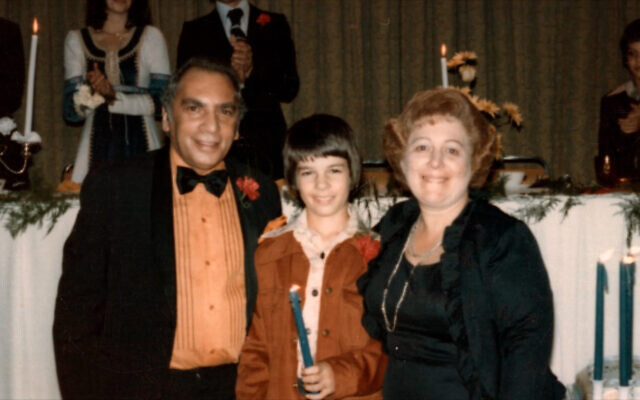
Jason Sherman with his parents at his bar mitzvah in Toronto, Canada, 1975. (John Minh Tran)
Planting roots in Israel
Most Jews around the world associate the JNF with the planting of trees – 240 million and counting. Since its establishment in 1901, it has also been involved in buying land for Jewish settlement in the Land of Israel, and a wide variety of agricultural, development, and environmental projects. The JNF is owner-custodian of 13% of state lands and is a wealthy organization, as reflected in its 2022 budget of NIS 1,257,985,534 ($366,720,067).
“I don’t get why they would not want to talk to me about their most promoted program, which is the afforestation of Israel,” Sherman said.
However, with the JNF unwilling to cooperate, Sherman turned elsewhere. “I needed to speak to someone about the trees,” he said.
With the help of an Israeli researcher, he determined that his tree must have been planted in Canada Park (also known as Ayalon Park), a seven-square-kilometer forested recreational area to the north off Route 1 between Jerusalem and Tel Aviv. Canadian Jews raised the funds for the park, and it was established around the time of Sherman’s bar mitzvah.
Strolling among the tall pines of Canada Park, Sherman realized it would be impossible to know which tree was his — if it had been planted at all.
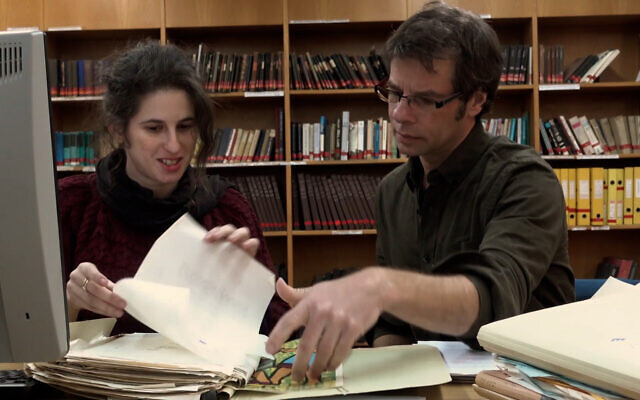
Archivist Orit Fooks helps Jason Sherman look at the Central Zionist Archives for records on the tree that was planted in his honor in Israel following his bar mitzvah in 1975, as seen ‘My Tree’ documentary film. (John Minh Tran)
Sherman was told that the JNF planted pine forests in Canada Park because they grow and cover areas quickly. The filmmaker interviewed arborists who said that pine trees are not indigenous to the region and are susceptible to wildfires and a host of other problems.
In the film, a representative of the Society for the Protection of Nature in Israel takes Sherman to an open grassland area in Israel’s south and complains that the JNF plans to plant a forest there, changing the environment and endangering wildlife.
In an interview with The Times of Israel, MK Alon Tal, chair of the Knesset subcommittee for environmental and climate impacts on health and a leading Israeli environmental activist and academic, took exception to this claim.
“The is an extremist opinion. The JNF is not sullying the natural landscape and no wildlife is being hurt,” he said.

MK Alon Tal attends an Education, Culture, and Sports Committee meeting in the Israeli parliament ahead of the opening of the new school year, August 16, 2022. (Oren Ben Hakoon/Flash90)
According to Tal, who does not appear in the film, the JNF is reversing the overgrazing that occurred over centuries by planting trees. Forests are also critical to preserving areas for recreation in nature in a tiny country that is losing 30 square kilometers annually to urban development.
“There is an important place for these forests in a country that is becoming more and more crowded. And with climate change, forests’ carbon sequestration in the soil is vital,” Tal said.
Tal pointed out that Sherman’s emphasis on pine forests is irrelevant and misleading. While pines were the JNF’s way of quickly covering land in Israel’s early years, it’s been many years since these trees were in favor.
“Nothing is done haphazardly now. For decades now, there have been detailed plans and the JNF is very careful about the diverse species that are planted today,” Tal said.
Lives uprooted?
As interesting as the discussions of pine trees were, Sherman was far more concerned that his tree was ostensibly planted where Palestinian families once lived.
Canada Park was built over the ruins of the Palestinian villages of Imwas and Yalo. The villages were captured by Israel from Jordan during the 1967 Six Day War. They were razed and their inhabitants expelled on the orders of the Israeli leadership, who wanted to widen the Jerusalem Corridor.
A representative of Zochrot, an organization that exposes and disseminates historical information among Israelis about the Palestinian Nakba, posits in the film that the goal of the planting of Canada Park’s pines was the rapid elimination of remnants of the Palestinian villages.
“Was I made an accomplice to a cover-up?” Sherman wondered.
It’s absurd to think that a 13-year-old in faraway Canada could be guilty of anything related to the realities of war in the Middle East. However, Sherman — today a man of 60 — now questions the ethics of the JNF’s presumed lack of full transparency with donors.
He wonders whether his parents, relatives, or congregational leadership (whoever donated) were fully informed about the land upon which Canada Park was planted — and whether they would have cared.
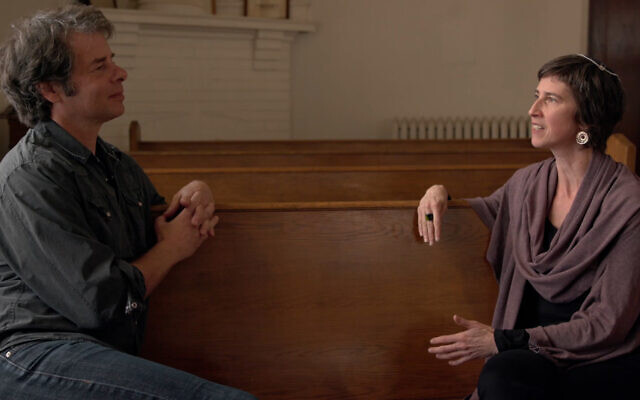
Filmmaker Jason Sherman (left) in conversation with Rabbi Miriam Margles at the Danforth Jewish Circle in Toronto, as seen ‘My Tree’ documentary film. (John Minh Tran)
Now that Sherman knows Canada Park’s history, he asks himself whether he is required to make amends. If so, how? For him, “his” tree is not just a tree but is rather a symbol of his relationship with Israel. This journey has complicated it.
In seeking answers to his moral quandary, he has heart-to-heart conversations with a rabbi in Toronto and a Palestinian American born in Imwas who is now living in Arizona.
Sherman also interviewed Canadian Jews who ardently support the JNF, and for whom there is no ethical or moral issue. The administrator at the synagogue where he became bar mitzvah reports that it is still presenting bar and bat mitzvah teens with tree certificates.
A woman nicknamed “the tree lady,” who for decades was tasked with typing up and sending out the certificates, gets emotional about how much her trees in Israel mean to her now that she is unable to travel there again.
In a tense scene, a former JNF Canada president who was instrumental in envisioning and implementing Canada Park doesn’t have much compassion for “Ahmed” who “left” his village “willingly” on the instruction of the leaders of the attacking Arab nations.
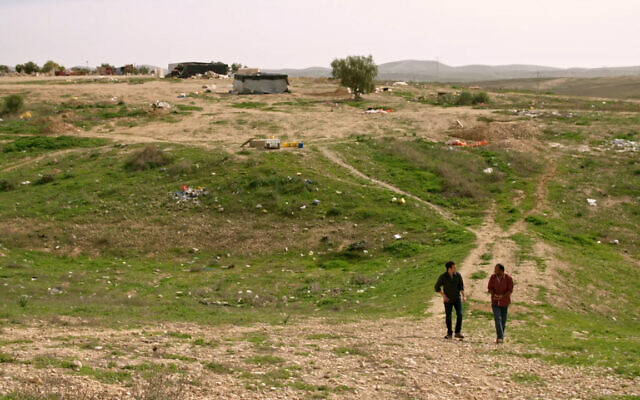
Jason Sherman tours the Bedouin village of al-Araqib in the Negev, Israel, as seen in ‘My Tree’ documentary film. (John Minh Tran)
Film goes further afield
Sherman said he repeatedly pushed current JNF leadership in Israel and Canada to answer some hard questions.
“Believe me, I wanted the JNF to participate. I still do. I would even recut the film if they would speak to me,” Sherman said.
It’s doubtful, however, that the JNF would have anything to say to Sherman given that “My Tree” goes far beyond his personal pine. The film introduces viewers to one of several Negev Bedouin communities at legal odds with the JNF over land disputes, and to a former American JNF board member who resigned in anger after learning that the organization was involved in the eviction of a Palestinian family from their home in East Jerusalem’s Silwan neighborhood.
Had Sherman’s scuttled second filming trip taken place, he would have probably also added into “My Tree” something about the fact that the JNF controversially invests in Jewish settlements over the Green Line.
In response to a request for comment from The Times of Israel about the organization’s relationship with Israel’s government, a JNF spokesperson said, “As a forestry authority, KKL-JNF will continue to plant durable and high-quality forests for the well-being of the residents of Israel.” He added that “as an independent organization, [we] from time to time cooperate with the government to actualize the goals and values upon which our organization was built and established.”
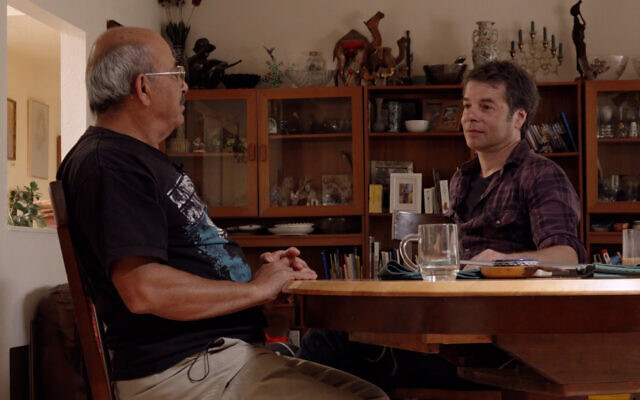
Jason Sherman (right) visits with Palestinian-American Mohye Abdulaziz, a former resident of Imwas now living in Arizona. (John Minh Tran)
From watching “My Tree,” it doesn’t seem that Sherman begrudges all the good that the JNF has done for Israel and Israel-Jewish diaspora relations over the last century. But with authoritative and current pro-JNF voices like Tal’s conspicuously missing, the film is unbalanced.
Ultimately, it’s a narrative of how a sapling planted in the name of a 13-year-old Canadian Jewish boy can grow to the point of shaking the roots of his relationship with Israel.
“I do feel that I was literally and figuratively made an accomplice to a cover-up. It didn’t have to happen, and it shouldn’t have happened,” he said.


